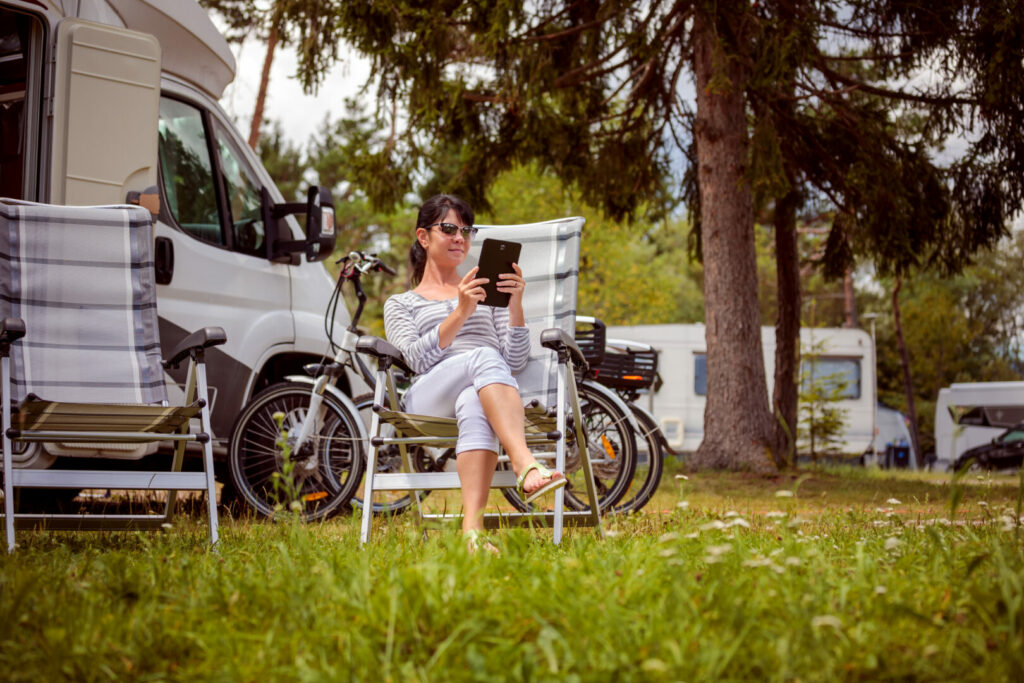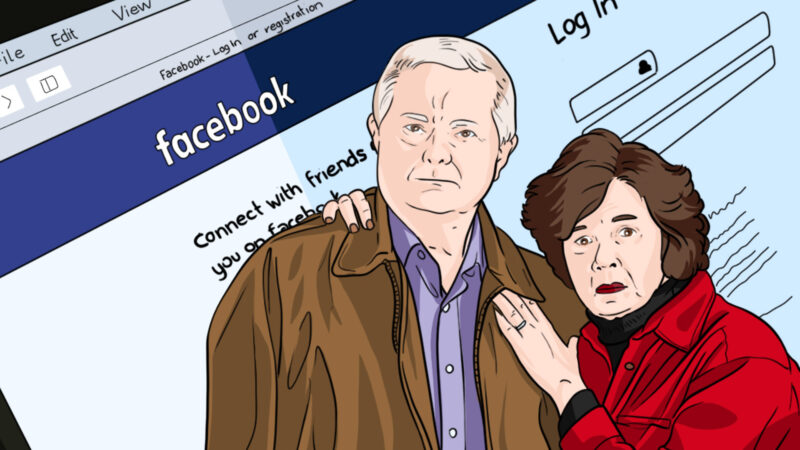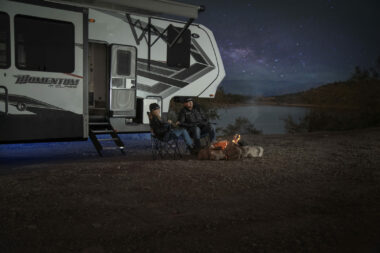Table of Contents Show
RV Facebook groups can have helpful members, new friends, DIY and how-to discussions, and more. But what do you do when your favorite RV Facebook group isn’t a healthy place for you to be anymore? And how do you determine when it’s doing you more harm than good?
In this article, we’re sharing the best and the worst about Facebook groups to help you determine whether or not they add value to your life.
RV Facebook Groups Can Be Valuable Places
You can find Facebook groups for just about every interest you can imagine, including dozens (if not hundreds) of Facebook groups dedicated to many aspects of the RVing lifestyle.
RV Facebook pages can help members come together, learn, share tips, and make new friends. But sometimes, they end up doing you more harm than good.

Are RV Facebook Groups Doing You More Harm Than Good?
So how do you know if RV Facebook groups are doing you more harm than good? We’ve got a few of the major things to look out for here. We’re sharing the good and bad of joining one.
The Good: Helpful Discussions
Perhaps one of the best things about Facebook groups is the helpful discussions. Members post questions, stories, or unique perspectives.
These discussions can help open your mind to new ideas, teach you an RV hack that you never thought of before, and help you make new friends. But sometimes, these conversations go sideways, and it’s turned into a big fight before you know it.
The Bad: Political Divisiveness
Have you ever spent time in a Facebook group where members just couldn’t stop arguing about their political beliefs and opinions? Some RV Facebook groups out there are rife with this kind of thing.
It’s important to understand that everyone has their own political opinions and beliefs. Politics can become one of the biggest things that people disagree on. Most Facebook groups have rules to keep politics out and just focus on things that relate to RVing, but sometimes things slip through the cracks.
If an RV Facebook group has many political arguments, it might be doing you more harm than good.
Pro Tip: Saying goodbye to Facebook, but still want an online RV community? These are The Best RV Forums we think you should join!

The Good: Location & Route Recommendations
Have you ever planned an RV trip to a new location but found yourself worried about the route or the best places to stop for gas with a big rig? RV Facebook groups are a treasure trove of help in these situations.
Many groups have over 10,000 members and hundreds of years of collective RVing experience. Just post a question about your planned route, and you’ll get tips, tricks, advice, and suggestions for cool stops you might not have thought of before.
The Bad: Argumentative People
Some people just love to argue. And others have nothing better to do than sit on Facebook and pick fights with well-meaning people.
If you find yourself in a Facebook group that seems to have more than its fair share of argumentative members, it might be time to see yourself out.

The Good: DIY and How-to Guidance From Experienced RVers
With tens of thousands of RVers on Facebook, you’ll find helpful DIYs and how-tos in Facebook groups. You can even join specific DIY groups for things like solar, electric, decor, renovations, and more.
If you want to DIY something in your RV but have no experience, Facebook groups can provide ideas, instruction, and help.
The Bad: Know-It-Alls
Every group has a know-it-all, whether in person or online. And some Facebook groups seem to attract dozens. You’ll encounter many people who think they know more than everyone else, and while that is usually just annoying, it can become a problem.
If you belong to a group where know-it-alls hijack the comment threads, this annoyance may cause you more stress than it’s worth. Plus, they may offer wrong information.

The Good: Brand Specific Member Groups
Ever since the inception of the RV industry, there have been brand-specific groups — even before the internet.
Brand-specific special interest groups help companies build their reputation and community and keep customers coming back. It also provides a way for similar model owners to find each other and share tips and information.
You can join brand-specific Facebook groups for just about every major RVing company you can think of. If you want to connect with other owners of your specific RV, try searching for the brand name. You may find some Facebook groups for specific RV models, too.
In addition to connecting with other owners, some brand-specific RV Facebook groups also have company employees to help with customer service inquiries, feedback, and take suggestions.
The Bad: People Acting Like They’re Better Than Others
Have you ever heard of the term keyboard warrior? A keyboard warrior is someone who hangs out online acting like they’re better than other people, starting arguments, and more. They’re called a keyboard warrior because they would never behave that way in real life but feel empowered by the anonymity of hiding behind a screen.
Some Facebook groups have people who think they’re better than others, whether because they own a specific brand or a myriad of other reasons. If you find yourself in a Facebook group with many negative people, it can affect you more than you might realize.
Pro Tip: You can’t check Facebook while on the road, if you do not have solid internet. This is How We Stay Connected on the Road.

The Good: Finding a Sense of Community in an Isolating Lifestyle
One of the lesser talked about aspects of the full-time RVing lifestyle is how isolating it can become. Sure, thousands of people travel but finding people you have a lot in common with can pose a challenge.
Facebook groups help people connect with like minds. RV Facebook groups can become an amazing place to find people with similar views as you, plan meetups and get-togethers, and find your own community on the road.
The Bad: Bullying, Hate Speech, and False Information
Bullying, hate speech, and the spread of false information are three of the biggest problems on the internet today. While many RVing Facebook groups have a small team of admins to keep the peace, sometimes things slip through. Some groups become too large to moderate constantly.
Cyberbullying and hate speech are incredibly damaging and toxic behaviors. If you belong to a group where members bully one another, spew hate, or consistently post and spread false information, you should probably leave. If the admin team doesn’t do anything to stop this behavior, it will likely get worse.

How to Determine if an RV Facebook Group Is Doing You More Harm Than Good
Are you in a Facebook group (or several) that brings stress to your life? Here are a few ways you can determine if it’s doing you more harm than good.
You Find Yourself Irritated While in the Group More Often Than Not
If you find yourself irritated in the group more often than you enjoy yourself, it’s probably not a good idea to stay. Facebook groups should add value and enjoyment to your life, not irritation.
You Find Yourself Arguing in Comment Threads
It can be hard not to participate in an argument, especially when it’s something you feel passionately for or against. Participating doesn’t do anything productive or constructive.
If a group consistently misaligns with your beliefs or opinions, it’s probably about time to head out.

You Think About Things in the Group (Negatively) Even When Not Online
Do you find yourself thinking about arguments or threads from the Facebook page, even when offline?
If you realize that an RV Facebook group begins affecting you in your personal life, this is a good sign to leave it.
The Admins Don’t Do a Good Job at Shutting Down Toxic Threads or Booting Unruly Members
Some RV Facebook groups have a small admin team that can’t monitor the group 24/7 but does their best to keep it a valuable and helpful place.
But some groups have admin teams who don’t care or have toxic opinions themselves, and they will let the group members run rampant. If a group doesn’t have an admin team with integrity, leave it.

Leave Groups That Don’t Bring Value to Your Life for Your Mental Health’s Sake
Leaving toxic Facebook groups isn’t just necessary for your mental health — it’s necessary for your physical health too.
Stress triggers the release of hormones like adrenaline and cortisol. Cortisol is known as the stress hormone. These trigger your fight-or-flight response and can have lasting effects on your body.
Cortisol levels can remain elevated for several hours after being released and can have long-term effects on your physical health like heart disease, immune problems, and more.
If a specific Facebook group comes to mind when reading this article, it’s prime time to leave it.







Don’t forget the Block button. Using it is way better than arguing. Never argue with drunks, children or anyone on Facebook. You’ll accomplish nothing. Somethings on a FB forum that are guaranteed are that if you write about a repair or renovation you made, at least one person will say you did it wrong and another will say you paid too much. Also, the more expensive the coach featured in the forum, the worse the grammar is. That is hilarious. The Tiffin forum is excellent and the admins do a great job of keeping politics out of it and running off the haters. In any forum, be prepared for the same questions to be asked repeatedly and then for someone to go on a rant about the search function. Be patient.
Agreed. I had to give up a group due to excess negativity. I have had a wonderful experience with Grand Design and just refused to listen to it. Saying I have and issue and asking for help is fine. Adding something negative just to be seen, not so much, and most were easily discounted by other RVers stating that simply is not true. I realized it was bringing me down to see that and left the group. Thanks for all the great info, guys! 🙂
I think the worst thing about RV Facebook groups is the false perceptions that are created by people reporting their anecdotes. Take tires, for instance. Tires fail. They fail for a lot of reasons. Poor maintenance, accidents, and some are actually defective. Say the group has 15,000 members. Assume for this example each one owns a twin axle coach. That’s 60,000 tires. According to one manufacturer (and statistics are really difficult to come by, which doesn’t help anything), about 1% of their OEM tires fail. So that’s about 600 tire failures. And it seems that a high percentage of those folks rush to the group to decry their “bombs”. And people notice that, especially those who are just getting into the game. And the perceptions that creates are really difficult to counter. So people make decisions that are not based on any scientific evidence, but rather based on emotion (and other reasons which I’ll leave to the reader to speculate).
That’s dangerous, counterproductive, and wasteful. Some helpful folks will speak up and try to educate (good maintenance, use TPMS, etc.) but it gets really tiresome. Folks would rather believe folklore (It happened to me!!) rather than the evidence. Those conversations also tend to overshadow the truly useful threads, so the damage is double. It’s toxic.
P.S. I said these misperceptions are dangerous, here’s why. People will say, “you may be right, but I’ll do it for peace of mind”. I’ve heard a popular YouTuber say the same thing. The problem is, if that “peace of mind” is based on errant data, you’ll just be spending hard earned money to buy something that has the same chance of a given outcome than the thing they are switching away from. And that’s dangerous.